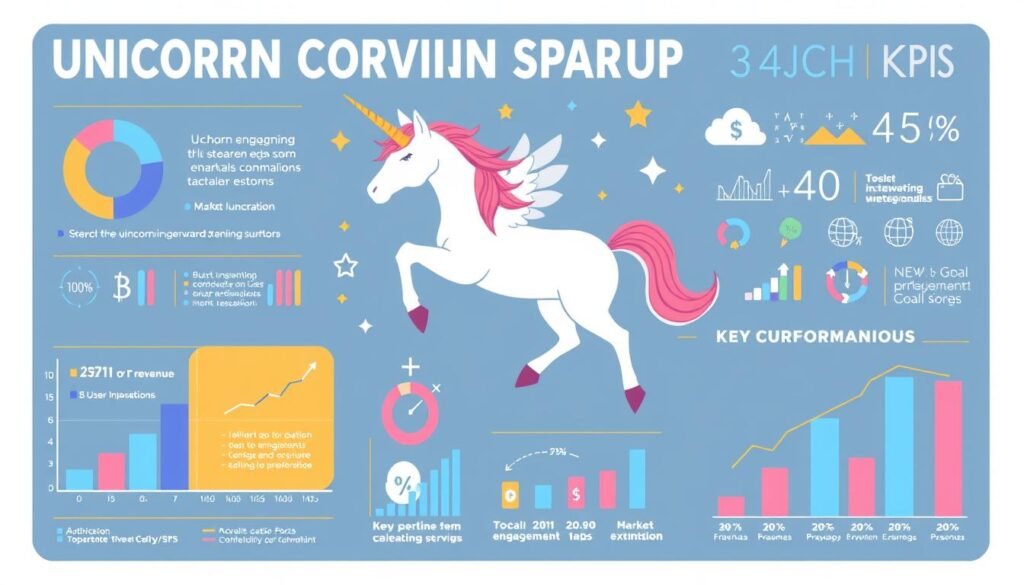Unicorns are startups worth over $1 billion. They show fast growth and new business ideas.
These companies inspire others in the startup world. They push what’s possible in business.
Unicorns aim to grow fast and be worth billions. This needs a clear plan and great work.
They must have a new idea that people love. Unicorns use new tech and smart data.
Being a unicorn means more than just money. It shows a company can change how things work.
Unicorns amaze people and spark new ideas. Their success often leads to more growth and money.
Understanding Unicorns in the Startup Ecosystem
“Unicorns” are private companies valued at $1 billion or more. These high-growth startups show the innovative power driving the startup ecosystem.
Unicorns impact the venture capital landscape. Their valuations influence investor expectations and funding decisions.
Startups aiming for unicorn status attract investors. They seek the next big disruptive innovation.
Unicorns have transformed the tech industry. They introduce new business models, products, and services.
These startups redefine what’s possible in technology. They drive consumer trends and shape the industry’s future.
The tech industry is now more dynamic. Unicorns play a vital role in this competitive landscape.
Key Motivations Behind Unicorn Goals
Startups aim for unicorn status, valued at $1 billion or more. This rare achievement is driven by several key factors.
Market dominance is a major goal for unicorn hopefuls. They want to lead their industry and shake up established players.
Unicorn status helps attract high-profile investors. These investors provide resources and boost the startup’s credibility.
Startups also want to show their scaling potential. A $1 billion valuation proves they can grow fast.
This growth often comes from new tech and business models. It shows the company can last and change markets.
Common Goals for Unicorn Startups
Unicorn startups are ventures worth $1 billion or more. They focus on three key areas: revenue growth, user acquisition, and global expansion.
These startups aim to be market leaders. They work hard to speed up their path to success.
Revenue growth is crucial for unicorn startups. They want to show their business models can scale and make money.
These companies use strategies to get more customers. They also expand their product lines and improve pricing.
Revenue growth shows a unicorn’s potential for success. It helps increase the company’s value over time.
Unicorn startups also focus on user acquisition. They spend a lot on marketing and customer engagement.
A large, loyal user base gives unicorns an edge. It helps them grow and come up with new ideas.
Global expansion is another goal for unicorn startups. They want to reach beyond their home markets.
By expanding globally, unicorns can make more money. They can also become industry leaders worldwide.
Metrics for Success in Unicorns
Unicorn startups need more than money to show success. KPIs, growth rate, and customer retention are key measures.
These metrics show a startup’s performance and long-term potential. KPIs like user engagement reveal a unicorn’s efficiency.
Growth rate shows a startup’s momentum. Customer retention reflects a unicorn’s loyal user base.

Unicorns use these metrics to make smart choices. They can spot areas to improve and adjust their plans.
Top unicorns have strong KPIs and high growth. They keep customers loyal and turn ideas into leading businesses.
Challenges in Achieving Unicorn Goals
Startups face many challenges on their path to becoming unicorns. They must stand out in a crowded market with unique offerings.
Regulatory hurdles can slow growth and increase costs for startups. They need to stay updated on changing rules and adjust their plans.
Scaling a business is tough for unicorn hopefuls. They must manage complex operations while maintaining quality and profitability.
Successful startups overcome these obstacles with creative strategies. They use partnerships and adapt to market changes to reach their goals.
Strategies to Realize Unicorn Potential
Becoming a unicorn is tough, but some startups have cracked the code. They use smart plans to turn great ideas into market leaders.
Innovation is key for unicorns to stay ahead. They invest in new ideas and let workers be creative.
Unicorns take risks to grow fast. They often use low prices and big ad campaigns.
Teamwork with big companies helps unicorns grow. These partnerships can open doors to new markets and tech.
By using these tricks, startups can become the next big unicorns. They can change their industries and lead the way.
Case Studies of Successful Unicorns
Few startups become unicorns, valued at over $1 billion. Let’s look at Airbnb, Uber, and Stripe.
These unicorns show how disruptive innovation and smart growth can lead to success.
Airbnb changed how people travel by offering unique, personal stays. They grew by creating great products and smart marketing.
Airbnb became famous worldwide, attracting millions of guests and hosts. They won by joining the sharing trend and putting customers first.
Uber changed how we get around using phones and lots of drivers. They grew fast by adapting to different places.
Stripe made online payments easy for all kinds of businesses. They focused on being simple, reliable, and new.
This helped Stripe grow quickly in the world of money tech. They became a unicorn by doing things better.
Conclusion: The Future of Unicorns
The startup world is changing fast. Unicorns will likely evolve in the coming years. New trends may redefine what a unicorn is.
We might see more “super unicorns” with higher values. New unicorns could pop up in different fields.
How we measure unicorn success may change too. Money still matters, but other things are becoming important.
People now care about how unicorns help society. They want to know if these companies will last.
The future of unicorns depends on many things. New ideas, rules, and market changes all play a role.
Everyone in startups must work together. This will help unicorns keep growing the economy.
